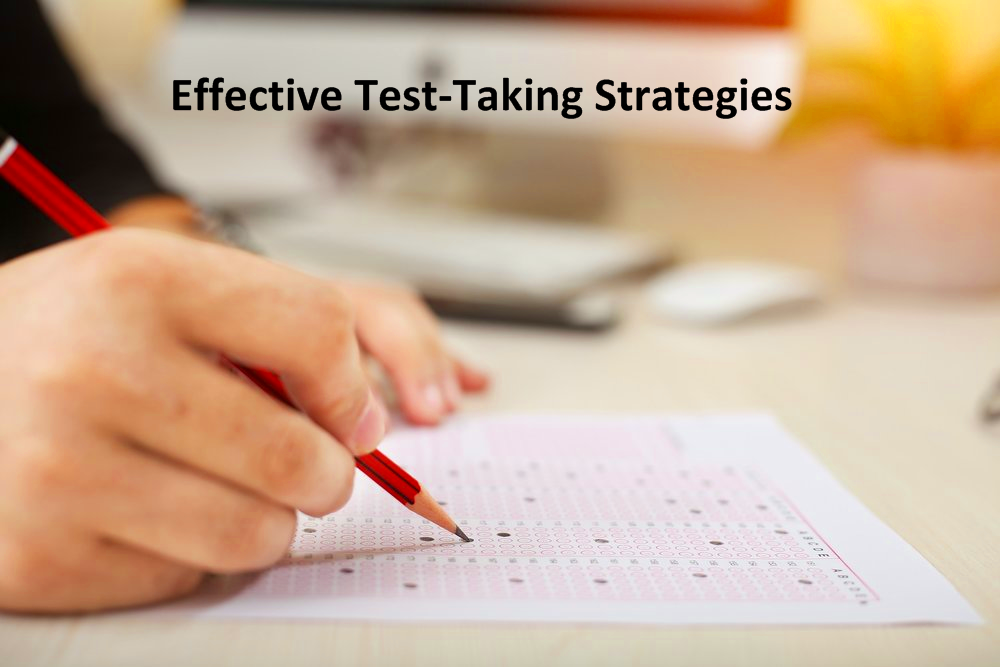Effective Test-Taking Strategies: Acing Exams with Confidence

Get ready to excel with “Effective Test-Taking Strategies: Acing Exams with Confidence.” Discover essential techniques to boost your confidence, manage time efficiently, and approach exams with a clear mindset. Elevate your test-taking skills and conquer your academic challenges.
Exams are not just a measure of academic performance; they also serve as a test of our understanding and knowledge in various subjects. Whether you’re a student facing a midterm, final exam, standardized test, or any other assessment, it’s natural to feel a mix of excitement and anxiety. However, the key to conquering exams and performing your best lies in employing effective test-taking strategies that will not only boost your confidence but also help you navigate through the challenges with ease. In this article, we will delve into a comprehensive guide on various techniques and approaches that can transform your test-taking experience into a successful journey.
Read More: Managing Exam Anxiety: Tips for Stress-Free Test Preparation
Understand the Material
Before embarking on any test preparation, it’s essential to establish a strong foundation of knowledge. Reviewing your class notes, textbooks, supplementary materials, and any study guides provided by your instructor will give you a comprehensive understanding of the subject matter. This foundational step ensures that you’re not merely memorizing facts but truly grasping the underlying concepts, which will prove invaluable when tackling complex questions during the exam.
Create a Study Schedule
Organizing your study sessions is a crucial element in effective test preparation. Develop a well-structured study schedule that allocates specific time slots for each subject and topic you need to cover. This approach prevents cramming and allows you to distribute your study load evenly over a period, enhancing your retention and understanding of the material.
Use Active Learning Techniques
Passive reading and note-taking can only take you so far in understanding complex concepts. Engaging in active learning techniques can make a significant difference. Summarize key points, rephrase concepts in your own words, or teach the material to someone else. Creating flashcards with questions on one side and answers on the other is another effective way to reinforce your memory and understanding of the subject.
Practice Regularly
As the saying goes, practice makes perfect. Regular exercise with mock tests and previous exam papers not only familiarizes you with the format and types of questions but also enhances your problem-solving skills. The more you expose yourself to different question styles, the better you’ll become at quickly identifying what’s being asked and formulating a coherent response.
Time Management
Time management is often a critical factor in test success. Before starting the exam, divide the allotted time among the number of questions or sections. Prioritize questions based on complexity and allocate more time to those that require in-depth analysis. A well-managed time allocation ensures that you have enough time to address all questions and review your answers if time allows.
Prioritize with the ABCD Method
When you encounter a question that seems challenging or unfamiliar, employ the ABCD method. Analyze each option provided and consider its plausibility. This method prevents you from getting stuck on one question for too long and helps you make an informed choice, even if you’re unsure about the answer.
Answer the Easy Questions First
Starting with questions you find relatively easy can provide an instant confidence boost. These questions help you build momentum and a positive mindset as you work through the paper. Plus, it ensures you’re not spending excessive time on one question, allowing you to allocate more time to the more complex ones.
Breaks and Nutrition
During lengthy exams, taking short breaks can do wonders for your focus and mental clarity. Stand up, stretch, and hydrate to prevent fatigue and maintain your energy levels. Additionally, paying attention to your nutrition, staying hydrated, and having a light snack can significantly impact your cognitive abilities and overall performance.
Avoid Overthinking
It’s easy to fall into the trap of overthinking a question, especially when you’re faced with challenging scenarios. If you find yourself spending too much time on a single question, make a mental note to come back to it later. Overthinking not only wastes precious time but can also lead to unnecessary anxiety and self-doubt.
Stay Positive
Maintaining a positive mindset is an often underestimated test-taking strategy. Positive thoughts and self-assurance can help alleviate anxiety and enhance your focus. Instead of dwelling on potential mistakes, focus on the questions you know you can tackle successfully. Your attitude plays a significant role in your performance.
Review Your Answers
If you manage to finish the exam before time is up, take advantage of that extra time to review your answers. Look for errors, omissions, or areas where you can improve your responses. This last-minute review can make a difference in catching small mistakes that might otherwise go unnoticed.
Guess Wisely
When faced with an unfamiliar question, don’t hesitate to make an educated guess. Use your knowledge of the subject to eliminate incorrect options and increase your chances of getting the right answer. However, avoid random guessing, as it might lead to unnecessary deduction of points.
Utilize Allotted Resources
If the exam permits, make sure to utilize any resources provided or allowed during the test. Whether it’s a calculator, formula sheet, or reference materials, these resources are there to assist you. Familiarize yourself with their usage during your study sessions to ensure you can use them effectively during the exam.
Avoid Comparisons
During the exam, resist the urge to discuss answers or strategies with your classmates. Comparing your progress with others can lead to unnecessary stress and self-doubt. Focus on your strategy and trust in your preparation.
Relax Before the Exam
The night before the exam can be a nerve-wracking time. Engage in activities that help you relax and wind down, such as light reading or practicing meditation. A good night’s sleep is crucial to ensure you wake up refreshed and ready to tackle the challenges of the exam day.
Read More: The Role of Motivation in Studying: Cultivating the Drive to Succeed
Conclusion
Effective test-taking strategies aren’t just about memorizing information; they’re about developing a comprehensive approach that helps you navigate exams with confidence and competence. By understanding the material, managing your time wisely, staying positive, and implementing various techniques, you’ll not only excel in your exams but also cultivate valuable skills that extend beyond the classroom setting.
FAQs
How can I overcome exam anxiety?
Engage in relaxation techniques, such as deep breathing or visualization, to manage anxiety. Remember that feeling a bit nervous is natural and can even boost your alertness.
Is last-minute cramming effective?
No, last-minute cramming rarely yields positive results. It’s better to follow a well-structured study plan over a sustained period.
What should I do if I don’t know the answer to a question?
Make an educated guess based on your understanding of the subject matter. Use the information you’ve studied to eliminate incorrect choices.
Can I use a calculator during the exam?
If permitted, yes. However, make sure you’re comfortable using it before the exam to avoid confusion or errors during the actual test.
How do I stay focused during a lengthy exam?
Take short breaks to stretch and relax, drink water to stay hydrated, and maintain a positive mindset. Remind yourself of your preparation and the strategies you’ve adopted.







